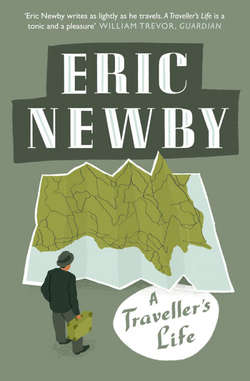Читать книгу A Traveller’s Life - Eric Newby - Страница 6
Introduction
ОглавлениеThis book is not an autobiography. It concerns itself for the most part, as the title suggests, with my life as a traveller in however modest a fashion from the time I was born more than sixty years ago.
Some of these travels were in distant places, in what used to be referred to as ‘foreign parts’. But this is by no means true of all of them, and some of them were very near home indeed, for I agree with Ogden Nash’s more or less unassailable definition of what constitutes a foreigner and what is a foreign part:
The place you’re at
Is your habitat.
Everywhere else you’re a foreigner.
If you can bring yourself to believe this, it takes a lot of the sting out of the cost of travel; and it is why I felt it reasonable to include my journeys through Harrods – a strange early adventure which befell me and my somewhat oversexed nurse while she was propelling me in a baby carriage through a London suburb – as well as an account of some equally bizarre excursions into the underworld of the London sewers by night while working as a fashion buyer of dresses, retailing at ten guineas and upwards, for a chain of department stores during the day.
The somewhat episodic nature of the book is because one cannot continue going round the world for ever without intermissions in which one tries to make money, licks one’s wounds, and re-equips oneself for further ventures. Even a traveller such as the Arab Ibn Battuta, born at Tangier in 1304 – perhaps the greatest traveller of all time who, in the course of his life, was estimated to have covered seventy-five thousand miles not counting detours, the only medieval traveller who is known to have visited the lands of every Muhammedan ruler of his time, quite apart from such infidel countries as Ceylon and China – was not always on the go, taking time off to get married here and there or to act as a counsellor of moderation to a mad potentate. In fact, travellers such as those who go into orbit and fail to come out of it, or travellers like the Jew who spat at Christ at the crucifixion and was condemned to wander the world for ever, can only be regarded as exceptionally unfortunate.
In his writings, the Venerable Bede compared the span of human life to coming out of darkness into a lighted hall and, having reached the end of it, finding oneself under the necessity of setting off once more into the all-embracing gloom. To me life has been more like one of those sections of autostrada on the Italian Riviera, on which there are lots of tunnels, some long, some short, with sunlit open spaces of varying lengths between them for which the darkness leaves one temporarily dazzled and often unprepared.
Why do people travel? To escape their creditors. To find a warmer or cooler clime. To sell Coca-Cola to the Chinese. To find out what is over the seas, over the hills and far away, round the corner, over the garden wall – with a ladder and some glasses you could see to Hackney Marshes if it wasn’t for the houses in between, in the words of the old music hall song, the writer of which one feels was about to take off.
Why have I travelled? Difficult to answer, that is when not engaged in the equivalent of selling Coca-Cola to the Chinese (large size dresses in Leeds), or travelling as a sailor or a soldier. Partly, undoubtedly, for amusement and sheer curiosity and partly, as Evelyn Waugh wrote in the preface to a book I wrote which described a journey through the Hindu Kush, to satisfy ‘the longing, romantic, reasonless, which lies deep in the hearts of most Englishmen, to shun the celebrated spectacles of the tourist and, without any concern with science or politics or commerce, simply to set their feet where few civilized feet have trod’.
